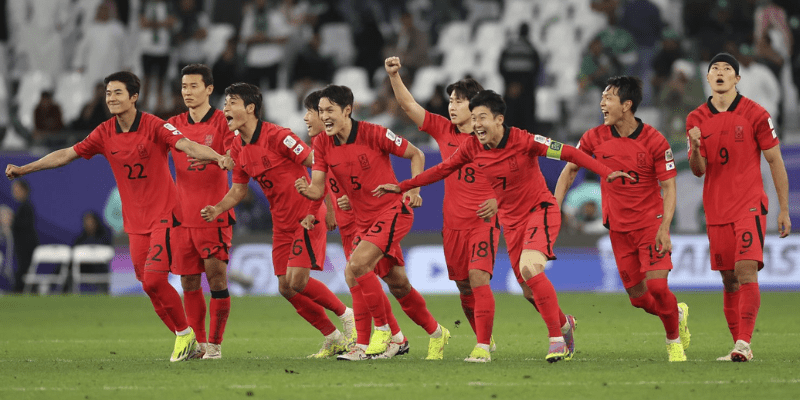Nicknames travel deeper than a tagline—they become identity. Why is South Korea’s national team nicknamed Taeguk Warriors? The answer isn’t just decorative—it’s a bridge between history, culture, and footballing spirit. In this article, ZaneyStrike will take you on a journey through the symbolism of “Taeguk,” the legacy of the nickname, and how it embodies the ethos of Korean football.
The Origins of the Name “Taeguk Warriors”

To understand the nickname, we must first dig into taeguk (also spelled taegeuk) — a core emblem in Korean identity. The word “taeguk” is a Sino-Korean term meaning “supreme ultimate” or “great polarity,” capturing the concept of harmony between opposing forces such as yin and yang. The swirling red and blue circle at the center of the South Korean flag is called the taegeuk, symbolizing the balance and interconnection of the universe.
Thus, Taeguk Warriors (태극전사 in Hangul) translates literally to “taeguk soldiers” or “taeguk fighters.” The name captures not only martial spirit but also a deeper symbolism: the national team as defenders of Korean harmony and dignity through sport.
Why That Name Resonates in Football
The South Korea national football team carries the nickname Taegeuk Warriors (or Taeguk Warriors) in parallel to titles like the “Tigers of Asia.” The nickname was adopted to signal that the players are not merely athletes—but symbols of national identity, carrying the weight of culture when they enter a match.
Here’s what makes the nickname meaningful in the football context:
- Cultural pride: The taegeuk motif is central to Korean identity and sovereignty, so invoking it in the team’s name strengthens fans’ emotional connection.
- Balance of styles: Just like the yin-yang principle in taeguk, Korean football is often praised for maintaining balance—solid defense, tactical awareness, and bursts of offensive flair.
- Warrior spirit: The “warrior” or “fighter” underscores the grit, fighting spirit, and perseverance the team tries to embody when facing formidable opponents.
Historical Evolution & Adoption
From early days to modern era
In the early years of South Korea’s international football history, players and fans gravitated toward simple identifiers: “the Reds” (because of their red jerseys) or “Tigers of Asia” (for regional dominance). Over time, as the national team matured and sought a more symbolic moniker, Taegeuk Warriors gradually came into wider use.
By the late 20th and early 21st centuries, media, fans, and the Korea Football Association began referring to the team using this nickname, embedding it in stadium chants, branding materials, fan merchandise, and match commentary.
Parallel nicknames in youth and variant squads
Interestingly, the under-23, under-20, and under-17 Korean national teams also share the nickname Taegeuk Warriors (alongside other names). This shows how the name has become an institutional identity across all levels, not limited to just the senior squad.
Symbolism in Colors, Badge & Identity
The taeguk symbol is central to the South Korean flag—divided red over blue, representing duality and harmony. That same symbol sets the emotional tone for the national team’s identity.
- Team colors (red and blue): The home kit is usually red—earning them yet another nickname, the Reds, while the fans are proudly called the Red Devils.
- Badge evolution: The team badge once featured only the national flag, but after 2001, a stylized tiger crest was introduced (while retaining the yin-yang red and blue colors).
- Visual branding: In stadiums, fan artwork, and merchandise, the swirling motion of the taeguk commonly features alongside silhouette warriors or dynamic football imagery.
Because the name carries both deep cultural meaning and fierce sporting imagery, it becomes a potent rallying cry for players and supporters alike.
What Being a “Taeguk Warrior” Means on the Pitch

Putting the nickname into practice, how has the South Korean team lived up to “Taeguk Warriors”?
Fighting in adversity
Korea has often faced footballing giants—Brazil, Germany, Spain—but has shown grit, never folding under pressure. The mentality of “warriors” reminds fans and players that every match is a battle to be fought.
Harmony in structure
Like the philosophical principle of taeguk, South Korean tactics often emphasize balance: blending organized defense, rapid transitions, and disciplined midfield link-up play. Even when chasing goals, they strive not to lose structural coherence.
Inspiring national unity
When the 2002 World Cup came to Korea (co-hosted with Japan), the triumphs and the deep emotional wave that swept the nation felt like the moment the nickname truly came alive. The “Taeguk Warriors” were not just playing—they were carrying the hopes and dreams of an entire nation.
Comparing with Other National Team Nicknames
Globally, many national teams adopt nicknames tied to wildlife, colors, or national symbols. But Taeguk Warriors stands out because:
- It’s directly drawn from a national philosophical and cultural symbol (taeguk).
- It fuses artistic symbolism (balance, duality) with an athletic metaphor (warrior), which is rarer than purely aggressive or animal-based nicknames.
- It links deeply to both the visual identity (flag, colors) and the ethos (balance + fight) of the national culture.
Unlike names that reference animals (e.g. “Three Lions” for England) or abstract notions (e.g. “Selecao” for Brazil), Taeguk Warriors carries a layered meaning.
Critiques, Misunderstandings & Mispronunciations
No nickname is immune to quirks. Over time, some common issues have surfaced:
- Spelling variants: “Taeguk,” “Taegeuk,” or “Taeguk Warriors” are all used, sometimes causing inconsistency in news or searches.
- Lost depth: For casual observers, the meaning of “taeguk” is obscure. Some see it merely as a poetic label, losing the philosophical depth behind it.
- Comparisons to the “Tigers of Asia”: Some purists prefer or continue to use “Tigers of Asia,” especially given Korea’s long association with tigers in folklore. But “Taegeuk Warriors” has gained ascendancy in modern branding.
- Mispronunciation: Non-Korean speakers sometimes misread “Tae-geuk” or place stress in the wrong syllable, diluting the intended resonance.
Even with such challenges, the nickname persists, adapted and accepted.
Why the Nickname Still Matters Today

In 2025, as Korean football continues its trajectory, “Taeguk Warriors” is more than nostalgia—it’s brand, identity, and emotional anchor all at once. The name:
- Empowers younger generations of players to see themselves as part of a lineage.
- Provides fans with a symbol they chant, wear, and believe in.
- Helps Korean football project a unified identity on the global stage, distinct among national teams.
When you watch Son Heung-min, Kim Min-jae, or their teammates don the red jersey, they carry more than just the national honor—they wear the taeguk symbol, embodying balance and fierce resolve. That’s the spirit of Taeguk Warriors.
Final Thoughts
Why is South Korea’s national team nicknamed Taeguk Warriors? Because “Taeguk” is a core symbol of Korean identity—balance, duality, unity—and attaching “Warriors” turns that symbol into a living pledge of grit, passion, and national pride. Over decades the name has grown.
If you’re hungry for more stories behind footballing identities—be it nicknames, national histories, or player legacy—stay with ZaneyStrike. Let us be your compass through the world of global football.






